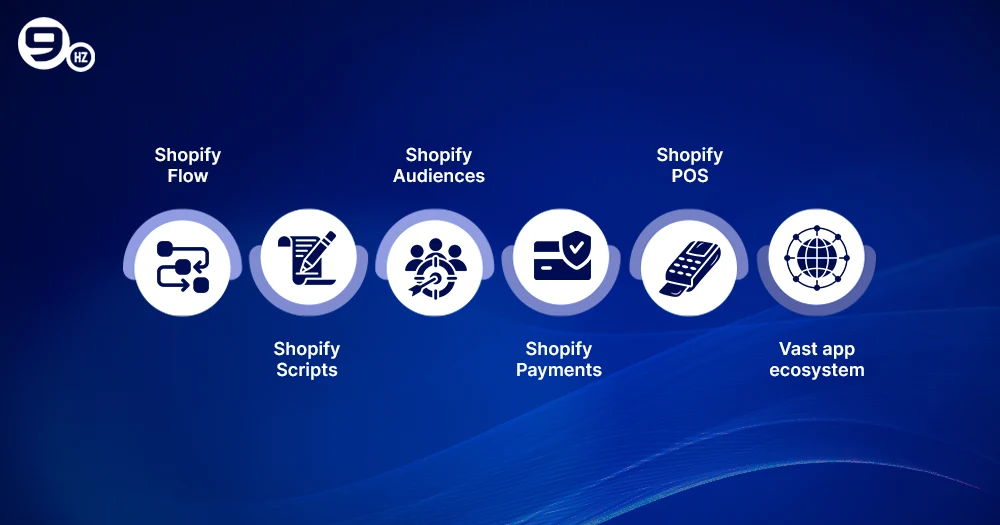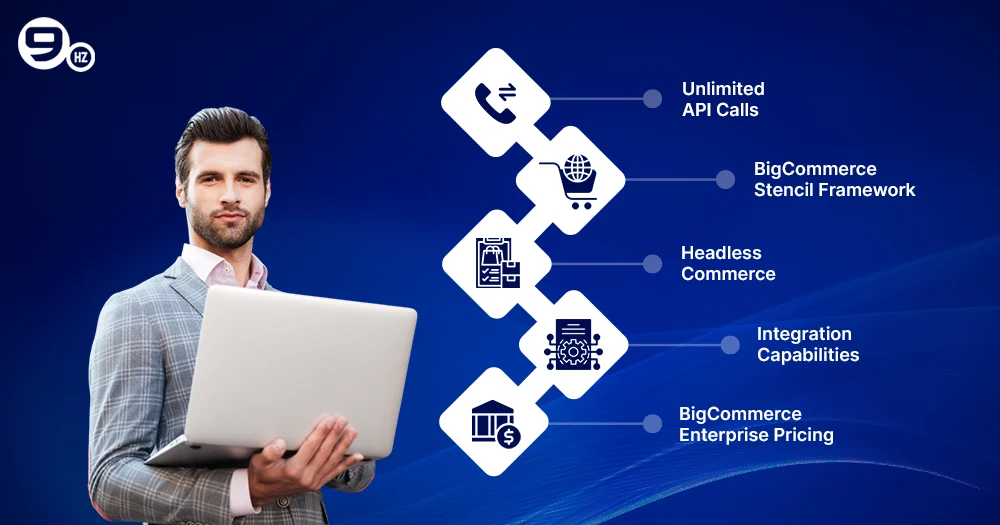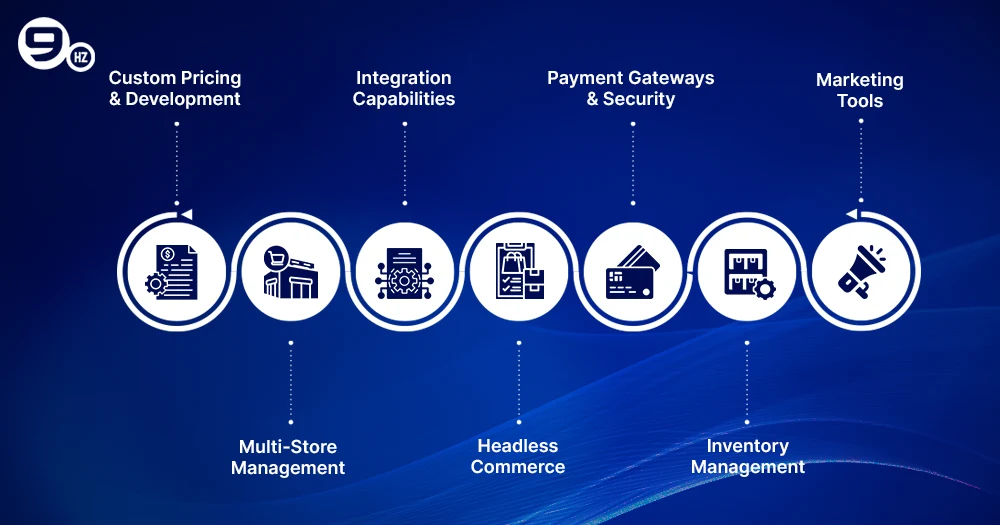Have you ever considered which eCommerce tool for businesses may genuinely help your business grow? For big businesses and companies that are developing fast, Shopify Plus vs BigCommerce are the two most preferred choices. Either platform may be used by businesses that need sophisticated scalability, easy administration of many stores, robust integration capabilities, and the ability to handle complex product catalogs.
According to a Statista report, revenues in digital commerce throughout the globe will rise from $3.66 trillion in 2026 to $4.96 trillion by 2030(Source). With business growth happening so quickly, picking the correct enterprise platform is no longer just a technical option; it’s also a strategic investment.
Shopify Plus vs BigCommerce Enterprise are made for high-volume retailers, complex retailers, and companies that need advanced payment gateways, automation tools, and support throughout the world. While both BigCommerce and Shopify are well-liked by expanding firms, they are not the same.
A trustworthy Shopify Development company may be quite beneficial in this instance. Our technology partners can assist you with any sort of setup, whether you want to go from Shopify Basic to having multiple stores or build up headless commerce with a storefront API. While cutting development fee levels and raising transaction fees, these organizations help businesses integrate ERP systems, third-party solutions, and marketing tools. Many firms really rely on these professionals to customize product catalogs, improve inventory management, and enable local payment methods to ensure client satisfaction across areas.
Let’s take a look at what makes Shopify Plus vs BigCommerce Enterprise strong on their own, and then we’ll compare the two to identify the best eCommerce platform for your company.
What is Shopify Plus?
Shopify Plus is the best business plan for huge online retailers and companies that sell a lot of things. Shopify Basic is meant for small businesses and corporations. Shopify Plus, on the other hand, includes more complex tools that may help big companies run their businesses better, perform less manual labor, and expand into new markets.
Key Selling Points of Shopify Plus
- Shopify Flow: Businesses may utilize automation to accomplish mundane tasks like tagging customers, moving shipments, or spotting fraud without having to learn how to code.
- Shopify Scripts: BigCommerce enterprise clients may convert to Shopify with the aid of bespoke prices, discounts, and promotions.
- Shopify Audiences: Helps companies find buyers who are serious about buying by using the large number of Shopify users.
- Shopify Payments: Shop Pay makes it simple to check out by reducing credit card processing costs and providing local payment methods.
- Shopify POS: Integrates physical and online retailers to make sure that multi-brand encounters go well.
- Vast app ecosystem: With its hundreds of third-party applications, Shopify Plus enables companies to seamlessly integrate new functionality.
Shopify Plus has another major advantage in that it supports headless architecture. This means that the companies can use the store API to connect to other sites, like mobile applications or content management systems. This independence comes in especially handy for complex retailers or more complex product catalogs.
Pro Tip: The best choice is Shopify Plus because the system is easy to understand and has the capability to conduct enterprise-level processing.
Boost Sales With a High Performing Shopify Store
What is BigCommerce Enterprise?
The BigCommerce enterprise is the most advanced option of the ordinary BigCommerce. It is the kind of firm that is in need of autonomy, rapidity, and the ability to merchandise online in bulk. Unlike the standard package for small businesses, BigCommerce Enterprise offers specialized solutions to business entities that have multiple stores, need ERP integrations or require more customized pricing logic.
Core Features of BigCommerce Enterprise
- Unlimited API Calls: It is also possible to integrate businesses with third-party applications and ERP systems without any issues, and this is especially a big benefit when compared with Shopify Plus.
- BigCommerce Stencil Framework: Make sure that shops are user-friendly when using a mobile device and provide good customization provisions.
- Headless Commerce: It is compatible with a headless architecture, which allows organisations to build their unique front-end experiences by maintaining their back-end stability.
- Integration Capabilities: It is simple to integrate and use third-party payment processors, marketing tools, and fraud management solutions that are used in businesses of all sizes.
- BigCommerce Enterprise Pricing: It can vary on the basis of the number of orders offered, the desired features, and the requirements of the firm.
The platform is an enterprise platform, which is also suggested by the majority of BigCommerce users as it can handle complex retailers and, what is more, even complex product catalogs. The platform will also be of interest to businesses that have special operational needs due to its focus on seamless integration with third-party solutions.
Pro Tip: BigCommerce Enterprise is a decent option that can be recommended to stores aiming at independence since the system provides APIs and opportunities to implement sophisticated modifications.
Shopify Plus vs BigCommerce Enterprise: Quick Comparison
Both BigCommerce and Shopify Plus provide the vital features, which are constructed with the eCommerce platforms at the corporate level. Shopify Plus is independent with its huge app ecosystem, Shopify Flow for automation, and Shop Pay for a single tap checkout.
BigCommerce Enterprise, on its part, is unique in the sense that it allows you to make unlimited API calls, customization further through the BigCommerce Stencil Framework and integrates wonderfully well with headless commerce. Analyzing such key attributes, the company can teach a lesson at Shopify vs BigCommerce. This is a brief overview of Shopify Plus vs BigCommerce Enterprise to guide your decision on which one to pick:
| Feature / Capability | Shopify Plus | BigCommerce Enterprise |
|---|---|---|
| Core Features | Shopify Flow, Shopify Scripts, Shopify Audiences, Shop Pay, Shopify POS | Unlimited API calls, Stencil Framework, Headless Commerce |
| Customization | Vast app ecosystem, storefront API, third-party apps | Advanced customization via API, headless architecture |
| Payment Options | Shopify Payments, Shop Pay, local payment methods, third-party apps | Supports multiple third-party payment providers |
| Multi-Store Management | Simplified for managing multiple stores globally | Supported but requires more setup for global scaling |
| Pricing | Flat monthly fee + transaction fees (discounted with Shopify Payments) | BigCommerce’s pricing is custom, based on revenue and order volume |
| Integration Capabilities | ERP systems, technology partners, third-party apps | Strong integration with ERP, CRM, and marketing tools |
| Scalability | Strong automation for business growth | Excellent for more complex retailers and complex product catalogs |
| Support | Priority support, Shopify Plus community | Priority support, strong developer ecosystem |
| Best Fit | High volume retailers scaling rapidly | Complex retailers needing deeper customization |
Scale Faster with a Shopify Store Designed for Growth
BigCommerce Enterprise vs Shopify Plus: Pros and Cons
When placed side by side, you can note that BigCommerce Enterprise and Shopify Plus have multiple perks and disadvantages. Transaction costs are more affordable with Shopify Payments, and it is easier with Shopify Plus to deal with many stores. BigCommerce, in its turn, doesn’t limit the number of API requests you can make, has variable business costs and provides you with an opportunity to make complex changes. Companies that grasp these benefits and downsides may choose the finest eCommerce platform for development over time.
Shopify Plus Pros
- You can use Shopify Scripts and Flow to run big enterprises automatically.
- To make managing multiple stores simpler, I created tools for worldwide expansion.
- Shop Pay and Shopify Payments cut transaction fees and make shopping better.
- Shopify Audiences can help you locate the proper BigCommerce customers.
- A robust app marketplace for customisation and a vast app ecosystem.
Shopify Plus Cons
- It’s less versatile than BigCommerce Enterprise for complex product catalogs, however.
- The lowest credit card processing fee is dependent on Shopify Payments.
- The development fee is greater for connections that are more complicated.
BigCommerce Enterprise Pros
- Unlimited API calls are a major advantage for businesses that communicate often.
- There is significant support for headless commerce with headless architecture.
- Flexible pricing lets businesses scale quickly with BigCommerce Enterprise.
- With the BigCommerce Stencil Framework, it’s simple to modify how a design looks.
- Third-party payment providers and ERP systems are integrated.
BigCommerce Enterprise Cons
- Smaller App store than Shopify Plus.
- BigCommerce may not be affordable for high-volume retailers.
- In order to make any changes, you should have extra technology expertise and a development fee.
- It is not as easy to use as the SaaS Shopify service.
Detailed Comparison: Shopify Plus vs BigCommerce Enterprise
Enterprise businesses have a lot to consider when deciding upon Shopify Plus vs BigCommerce Enterprise: they both have basic features and capabilities to take into consideration. The two systems are good in their business offerings, yet it is typically clear which one will be superior to the other in the case of complicated retailers or retailers that have high numbers of customers.
1. Customization and Flexibility
There is a huge app ecosystem and thousands of third-party applications provided through the app marketplace of Shopify Plus. This allows the companies to use more advanced features without the need to develop much code. Businesses can create their own offer with Shopify Scripts and Flow, automate the store processes, and alter or change the way customers pay. However, it has restrictions on API requests, which could make it hard for more complex retailers to connect their companies.
BigCommerce Enterprise, on the other hand, is wonderful since it can be used in many different ways. The many API calls it offers enable businesses to seamlessly integrate with third-party solutions, ERP systems, and specialized tools. The BigCommerce Stencil Framework also makes it easier to modify the design of your store. It has built-in support for headless architecture, which helps developers build their own digital experiences that operate on many channels.
Takeaway: Shopify Plus makes it easy to make changes since it has an app marketplace. BigCommerce, on the other hand, allows companies with more sophisticated demands greater technical independence.
Maximize Your Revenue with a Conversion Focused Shopify Store
2. Pricing Models and Transaction Fees
Price is generally the most important thing for customers when they choose between Plus and BigCommerce.
- Shopify Plus charges a set monthly cost that begins at roughly $2,000 in addition to transaction fees. But if you utilize Shopify Pay, you won’t have to pay these costs. This may help companies save a lot of money on credit card processing costs while still enabling people from all around the globe to utilize Shop Pay and other local payment methods.
- BigCommerce Enterprise is different, however, and its pricing is established in a different way. The cost has a correlation to the number of orders you place, the value of your order on average and the number of functions you are using. Such autonomy may be a great thing for the users of BigCommerce, yet it may be costly to those sellers who buy in bulk.
Pro Tip: In the case you have hundreds of orders per day, Shopify Plus is typically more reliable and cheaper with Shopify Payments.
3. Multi-Store Management and Global Expansion
Modern companies should have the capacity to operate various stores.
- The process of running a business to run numerous stores can easily be managed by using Shopify Plus, and gain easy entry to new markets abroad. It also offers possibilities such as the management of multiple brands, geographical pricing, and local payments, which implies that it targets businesses that conduct international sales.
- BigCommerce Enterprise is also able to operate on any number of stores, yet to establish a company across the globe, usually, some more technological changes are necessary. It is also compatible with ERP systems to give it centralized control, hence it is one of the reasons why it is more suited to complicated retailers who have numerous goods.
Takeaway: Shopify Plus is easier to use when the companies want to expand globally, and BigCommerce is more difficult to use when the organization wants to connect the front-end and back-end systems and connect them in a more complex manner.
4. Headless Commerce and Storefront API
Both BigCommerce and Shopify systems are ready to handle headless commerce.
- With the storefront API in Shopify Plus, you can build your own storefronts that function on computers, phones, and even voice-enabled devices. With this strategy, companies can provide consumers with the same experience across all mobile devices and other platforms.
- BigCommerce Enterprise is one of the greatest headless architectures because it lets developers easily segregate the front end from the back end. Due to its unlimited API calls and comprehensive integration capabilities, it is particularly useful for more complex retailers that maintain complex product catalogs.
Takeaway: Shopify is working on making it easier for non-technical teams to use, whereas BigCommerce provides engineers greater authority. Both let you do headless commerce.
5. Ecosystem, Technology Partners, and Apps
- A vast app marketplace and a solid network of technology partners provide Shopify Plus a major advantage in its environment. Businesses may add new features without having to create a lot of code. They can do this using third-party payment sources and marketing automation solutions.
- BigCommerce offers fewer applications than other platforms, but its integration capabilities are superior right away. It also works well with complex custom pricing models, ERP systems, and features that let businesses talk to each other.
Pro Tip: Shopify Plus is the most acceptable choice when you must work with the programs of other companies. BigCommerce Enterprise allows organizations that have dedicated development capabilities to make more decisions.
Deciding Between BigCommerce Enterprise and Shopify Plus
The choice in favor of Shopify Plus or BigCommerce Enterprise is predetermined by the nature of your priorities faced by the enterprise.
- Look, simplicity, fast setup, plus the very refined automation tools of Shopify Scripts and Flow, the very best eCommerce platform, said Shopify Plus. It is especially great at working for businesses that want to scale fast and across markets while minimizing technical challenges.
- BigCommerce Enterprise is a better choice when you work with complex product catalogs, rely heavily on third-party payment services or have to use API calls without limitations. It is also appealing to complex retailers as well as organizations with large IT departments.
- In cases where small businesses are opting to transfer to enterprise solutions, the budget factor is very important in decision-making. With Shopify Plus, pricing is predictable with the use of the Shopify Pay feature, as compared to BigCommerce, which may increase in cost as your business grows.
Nevertheless, the two platforms allow businesses to transact in online sales, inventory management, and fraud management. The end choice has to harmonize with one’s business model, integration needs, and overall digital strategy for tomorrow.
How The NineHertz Will Help You in eCommerce Store Development?
The selection of a suitable enterprise platform is only the beginning. Implementation involves much technical knowledge and painless integration with solutions created to meet the future challenges, and thus success in implementation requires high technical knowledge, easy integration procedures, as well as solutions. The NineHertz, which is a top Shopify Development company, is here to help.
At The NineHertz, we offer customized solutions for businesses considering Shopify Plus vs BigCommerce Enterprise. We are experts in making ecommerce websites that look good and can grow easily.
Services We Offer for Enterprises
- Custom Pricing & Development: This cuts down on development costs and provides us with solutions that are specific to your company’s requirements.
- Multi-Store Management: Making it easier to run multiple businesses and grow in various directions.
- Integration Capabilities: Easy connectivity to ERP systems, third-party solutions, and marketing platforms.
- Headless Commerce: Creating Storefront API and headless architecture for brands with the need to deliver intriguing customer experiences.
- Payment Gateways & Security: Setting up local payment method selections, integrating with third-party payment services, and implementing enterprise-grade fraud prevention measures.
- Inventory Management: Helping businesses with robust inventory management and easy order tracking, even through complex product catalogs.
- Marketing Tools: Utilize Shopify Audiences and many integration tools to drive conversions.
As a technology partner for you, NineHertz assures that whichever platform your choice is-One-store shopping on Shopify or BigCommerce Enterprise-would be developed with optimization in performance, scalability, and consumer satisfaction.
Pro Tip: Collaborating with a competent development team like The NineHertz keeps risks at bay while speeding up time-to-market and saving you from expensive mistakes.
Conclusion
There is just about no true winner of the question “Shopify Plus vs BigCommerce”; it all depends on your business goals.
Shopify Plus works best for companies intent on automation, simplicity, and with their own app ecosystem. It empowers high-volume sellers to scale with ease, reduce transaction fees through Shopify Payments, and manage everything via their tools: Shopify Scripts, Audiences, and Flows.
BigCommerce Enterprise presents itself with the offer of unlimited API calls, top-tier headless commerce support, and flexibility for the slightly complex retailer who has special needs. An ideal enterprise option for companies that are a bit in need of technical control.
At last, we could say that Shopify Plus is about predictability and speed; BigCommerce is about flexibility and customization. Both rank among the best eCommerce platforms crafted for businesses eager to grow in this blink-and-you-miss pace of digital commerce.
Suppose one cannot make up his or her mind between Plus and BigCommerce Enterprise. It is pretty relevant to consult a professional Shopify Development company like NineHertz. Having the best guidance will set you on the right path toward choosing the best enterprise ecommerce platform, smoothly integrating it, reducing development costs, and, most importantly, laying down the groundwork for long-term success in business.
FAQs
1. Which is cheaper: Shopify Plus or BigCommerce?
Shopify Plus works on a set monthly fee with lower transaction fees through Shopify Payments, whereas BigCommerce Enterprise is priced on revenue. Hence, if predictable expenses are of concern, then Shopify is much cheaper; on the other hand, BigCommerce can be a little less expensive for complex retailers needing unlimited API calls.
2. Can I migrate from Shopify Plus to BigCommerce or vice versa easily?
Yes, migration from Shopify Plus to BigCommerce may be accomplished by utilizing tools from professional support. A Shopify Development Company or technology partner could help with migrating product catalogs, customers, and integrations, so that both ecommerce platforms run well with minimal downtime.
3. Which platform is better for high-traffic enterprise stores?
If they happen to be high-volume retailers, both platforms will scale well, but BigCommerce Enterprise gives unlimited API calls, and that is an advantage for heavily building integrations. But in comparison, Shopify Plus works better with automation, such as Shopify Flow, and faster checkout through Shop Pay, hence being ideal for the rapid global expansion.
4. Does BigCommerce support headless commerce like Shopify Plus?
BigCommerce indeed has strong support for headless commerce using headless architecture, in the same way that Shopify Plus can via the storefront API. This allows an enterprise to design custom front-end experiences while retaining heavy stability on its back end, just right for very complex product catalogs and omnichannel strategies.
5. Which platform is easier for non-developers to manage?
Shopify Plus is far more accessible for the layman due to its well-known SaaS platform, intuitive dashboard, and extensive app ecosystem. In contrast, BigCommerce requires, comparatively, more technical knowledge and therefore has traditionally served more complex retailers with in-house teams of developers.
Great Together!












